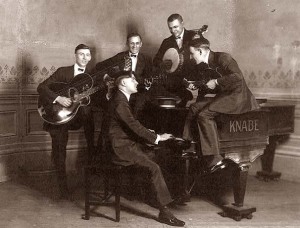This series discusses trademark issues that arise in the context of band names. My previous posts in the series have covered finding a name, registering that name, and avoiding problems when selling so-called “merch” goods, especially clothing, bearing the name. To close out this series, I’d like to take a few moments to discuss exactly how it is that bands own their names, from a legal perspective.
So, you’ve got yourself a band and things are going well. The band’s name is becoming more and more well known, and the future looks bright. Bands differ in many ways – they may play different music, using different instruments, in different venues, to different audiences, to different audiences.
Then again, anyone with any experience playing music will tell you that all bands have one thing in common: they tend to break up, sooner or later. When that happens, who owns the name?
To answer that question, which is after all a legal conclusion, you have to consider what exactly the band was… From a legal standpoint, that is. (And here’s a hint: it’s even better to think about this issue before your band breaks up…)
Partnership Is the Default Status
The law of Illinois and Indiana, where I am admitted to practice (and also the law of many other states), presumes that when a group of individuals act together for a common purpose and when they share the profits and losses of those actions, they have created what is generally referred to as a “common law partnership.” This includes people working together as a band since, when you stop to think about it, a band’s activities fit that general definition quite well.
Without a written agreement to the contrary, the law in most states will assume a number of things about a band’s partnership. One of those assumptions the law makes is that all members of the partnership have equal ownership of, and an equal right to use, all the assets of the partnership. In the case of a band, those assets include the band’s name.
Problems Under Partnership Law
So under general partnership law, unless there is a written partnership agreement to the contrary, all band members/common law partners would be equal owners of the band name and any associated logos. In addition, any current or former member would be permitted to use the name. Because trademark rights are determined by who uses a mark and not who created it, each of the members of the Band would be an equal co-owner of the group name under trademark law.
Given the propensity of musicians to join and quit bands, the prospect of former band members having some ownership interest in the name tends to be a little disturbing to the remaining band members.
Solution: A Written Partnership Agreement
Obviously, you can own and use a band name trademark as a common law partnership – most bands never even consider the issue, and as a result that’s how they own and use their names. You can even register the name as a trademark, listing the common law partnership as the entity that owns the mark. But absent a written partnership agreement to govern ownership of the name in the event a band member/partner leaves or the partnership dissolves (i.e., the band breaks up), figuring out who owns the rights in the name could get very messy.
Obviously, in the case of most music groups, a written partnership agreement is preferable to general partnership law. Once a band partnership agreement is created, it can function like a prenuptial agreement and, if need be, help make the break-up process less painful.
Other Alternatives: LLC or Corporation
It’s also possible to form a limited liability company (also known as an LLC) or a corporation for the band. These more formal forms of organization may work better for your band, depending on the sophistication of the band’s operations.
In either event, it’s a good idea to work with an attorney who knows the ins and outs of each form of organization, as it relates to music groups. As with many areas, spending a little money now on legal assistance may avoid much greater costs and headaches later.
PICTURE COURTESY OF PUBLICDOMAINPICTURES.NET.




